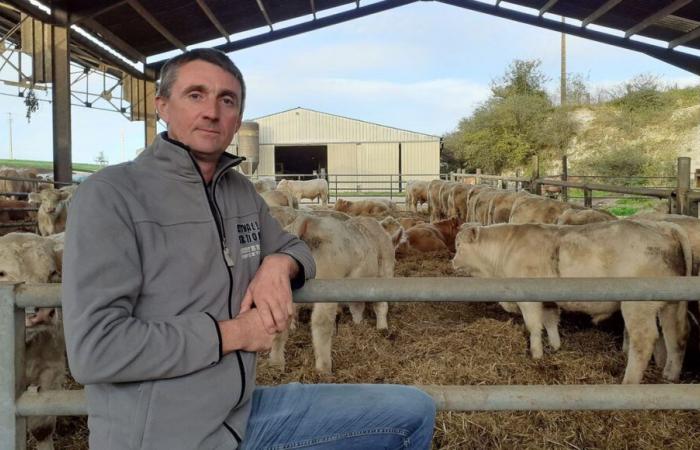In their stable outside the village of Bray-sur-Somme, near Albert, Charles Leignel's fifty suckling cows and little calves look happy. They have fodder, and space. “By cows we must respect a certain number of m2 minimum, so that they are comfortable with their calves, on a strawy, clean area”, he indicates. “Whileelsewhere, they are on top of each othersometimes in multi-story stables.”
Elsewhere, it is in South America. THE Mercosur countries : Argentina, Uruguay and especially Brazillarge beef producers, could flood the European and French markets with their cheap meat. If the European Union concludes a free trade agreement with them.
Influx of cheap meat
Negotiations on this treaty are relaunched in Brussels. Several countries such as Spain and Germany are pushing for adoption. France, through the Minister of Agriculture Annie Genevard, Michel Barnier, and the Minister of the Economy Antoine Armand, ensures that it uses “all means” to prevent this adoption.
“If we produce good quality meat here with current standards, we can't be competitive with foreign countries that have no standards equal to ours and meat of lower quality”insists Charles Leignel, from his stable in Bray-sur-Somme.
Thomas Giraudeau
He is also worried about his hundred hectares of crops. sugar beet. Because these South American countries also produce sugar. This potential long-term competition is added to the poor harvests in 2024due to the bad weather. “Not enough sun, a lot of rain. The plant hasn’t done enough photosynthesis, so there isn’t enough sugar in the root”indicates Charles Laignel. “The harvest is not yet finished but we will be around 75, 80 tonnes per hectare, 15 to 20% less than normal years“. The drop is even more brutal for cereals, the quintals harvested for wheat and barley are 35 to 40% lower.
More seedlings to plant
Last winter, Charles Leignel demonstrated several times, following his comrades on the roads around Amiens. But since then he still waiting for concrete answers to the demands of farmers, particularly on decent cost prices. “I understand that the government cannot make a decision like that in one day,” he nuances. But to wait eight months is a bit long!”
The cereal grower and breeder says he is ready to protest again in the coming weeks, to be continued the call launched throughout France by the FNSEA and the Young Farmers. But it will be harder to leave the farm, “there are still seedlings to plant, animals to enter the stables, beets to harvest”

Thomas Giraudeau
Nicolas Beugnet, too, wonders. He has the same work as Charles Leignel to carry out on his La Chaussée-Tirancourt farm, west of Amiens. “It was less heavy, we sacrificed a little less work on the farm last winter, when there were no more harvests or sowing,” he explains. He plans to demonstrate again from mid-Decemberwhen workloads will have gone down a notch on operations, and if the movement lasts until then.
The feeling of having demonstrated “for nothing”
Nicolas Beugnet is also overcome by a form of resignation. “We went on a two-week demonstration last winter. I took part in road blockades. We closed supermarkets for several hours, in Rivery, in Amiens-Nord. And all that for what? Apart from the tax on non-road diesel. Now she is to us directly removed from the invoice. Whereas before, we had to file a file, and this sum was returned to us months later. So it changes the cash flow a little, but not fundamentally.”
“I can think about it, apart from that”he adds, “I kind of feel like I did this for nothing.” So he wonders if he's really going to mobilize again. Especially since he says he does not want to be associated with demonstrations which, unlike last winter, could this time slip up according to him. He talks with many farmers in the Somme, makes silage for them, and feels even more exasperated than last winter.
“At the time, we didn’t do any major damage to the supermarkets. We didn't breakand we have always freed the roundabouts at times when many motorists are passing through, in the morning and evening.”he specifies. Nicolas Beugnet was struck at that moment by the many drivers stopping to send them messages of support. “I'm not sure we'll be able to hold the guys the same way this year when we are going to release them on a roundabout. When there is more money in the coffers, and people work 80 hours a week, they are exhausted.”
Special day this Friday on France Bleu Picardie
This mobilization of farmers will be at the heart of a special day, this Friday, November 15, on France Bleu Picardie: reports on farms, interviews with political and union leadersbetween 6 a.m. to 9 a.m., then in “Bienvenue chez vous”, from 9 a.m. to 10:30 a.m., around Joseph Laurin and Florent Vautier. At 1 p.m., Michel Barnier, the Prime Minister, will answer questions from our listeners on this agricultural crisis.

Thomas Giraudeau









